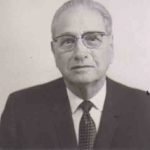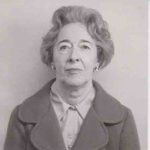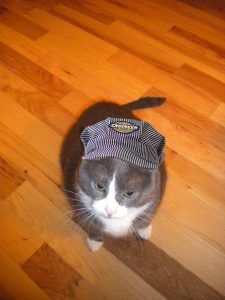The Train
By
James Macon Walton
Both my sister and I remember the trip, but neither of us can remember just when it occurred. The date is not really important–it was sometime around 1950. My father and mother, and my sister and I were on a family summer vacation. Wherever else we went on that trip, the place which is relevant was our stop in Calico Rock. At that time, Dad was the pastor of the First Methodist Church in Little Rock. He and my mother were returning to the place where Dad had served his first “charge.” They still knew some of the people in the town and took the opportunity of our trip to stop for a visit–the first since they left some twenty years before.
Calico Rock is a small town in north central Arkansas, south of Mountain Home and northwest of Batesville. Before we arrived, my father told my sister and me that the people in this town and in the surrounding areas had a special characteristic. They did not ask anything about another person’s personal life. They would not ask us where we had been or where we were going, what we had done or what we were going to do. My sister and I were cautioned that we ourselves were not to ask any personal questions of anyone in town during our stay. And, indeed, other than one question asked by the teenage daughter of one of the families with whom we stayed, no one in Calico Rock asked us anything about our personal activities.
After we left Calico Rock for wherever else we were headed, Dad told the story of his and my mother’s arrival in this town in November of 1931, and this story provided an illustration as no other of the practice of the locals to mind their own business and not to meddle in the affairs of others.
My father had grown up on a farm in eastern Arkansas for which his father was the “manager.” Dad’s mother died when he was fourteen, and he chose to leave home when he was sixteen without completing school. He lived a meager and rough life for a number of years–riding the rails to work in the wheat fields of Kansas, then returning to work as a janitor in a bank in Helena. Thereafter, he became a cotton buyer for a firm in Helena run by two wealthy men who were partners in the business in the town. It was then, and under those circumstances, that he, very much alone in life, attended a revival at a camp meeting and got “The Call,” deciding that he wanted to become a preacher.
My father was fortunate to receive the patronage of these two men who took an interest in him and his goals. Dad was able to enroll in the Academy affiliated with Hendrix College in Conway. He finished his high school in one and a half years and college in three and a half years, going on to earn his B.D. degree from the Divinity School of Duke University. During his time in graduate school, he met and married my mother, who lived in Helena. After Divinity School, Dad was accepted into the North Arkansas Conference of the Methodist Church “on trial.” He was appointed to serve his first pastorate at the Methodist Church in Calico Rock.
When it came time for my father and mother to travel to his new post, Dad went to the train station in Helena to purchase tickets for the trip to Calico Rock. The station-master in Helena was a man who knew my father from his days as a cotton buyer for the firm in town. This man explained to my father that he and my mother would travel from Helena, changing trains once or twice until reaching Newport, where they would board the White River Division of the Missouri Pacific for the onward journey to Calico Rock. The man went on to explain that the train from Newport did not stop in Calico Rock, so they would need to go past that town, to Cotter, where they would have to spend the night and take the “local” out the next day back down to Calico Rock. Having said that, the man thought for a moment and then said to my father, “Oh, there’s no need for that. You’ve given this railroad a lot of business over the years. I’ll just wire St. Louis and have them stop the train for you in Calico Rock.”
My father accepted this offer as a professional courtesy and thought nothing of it. Dad wired the church officials in Calico Rock giving them the date and time of his arrival. After he and my mother boarded the train in Newport, the conductor, when he came to them, looked at their tickets and repeated the original comments–the train did not stop in Calico Rock; they would have to go on to Cotter, spend the night, and take the local out the next day. My father said nothing, knowing that the conductor would get his instructions later during the trip. And, after a while, as he had predicted, the conductor returned, verifying that they were the folks for Calico Rock. He then said that he had received orders to stop the train in Calico Rock and told them when the train would arrive there.
When my parents got off the train in Calico Rock, they noted that perhaps a hundred or more people were sitting and standing around the station, and up the sides of the surrounding hills. My mother remarked, “They sure turn out to meet the new preacher.” Members of the church were on hand to greet them and walk with them to the parsonage. And thus went my parents’ arrival in Calico Rock. Or so it seemed!
A good many weeks after this day, my father was sitting on the porch of the parsonage, as was his practice after supper. A member of the church walked by and accepted my father’s invitation to come up, sit, and talk. After some rather general conversation about nothing in particular, the man became silent for a while. He seemed to be agonizing over a major decision. After a moment, he queried if he could ask my father “a personal question.” My father, having no idea what was on the man’s mind, responded that he would answer the question if he could. The man still hemmed and hawed, struggling to voice his question. Finally, having found the needed resolve, he blurted out, “How in the Hell d’you stop that train?!”
As it turned out, in the history of the town the train on which my parents were traveling had never before stopped in Calico Rock. When my father’s telegram arrived, and its contents became known, the town folk divided into two camps–those who believed that the train would stop and those who believed that it would not. Wagers were made. And thus it was that, at the appointed time, the town-folk did indeed turn out, not so much to greet the new pastor as rather to see what power he held over the Missouri Pacific Railroad! Later, my mother remembered that, as they were walking from the station into town, she had overheard one of the men say to another, “Well, that’s a Coke you owe me.”



